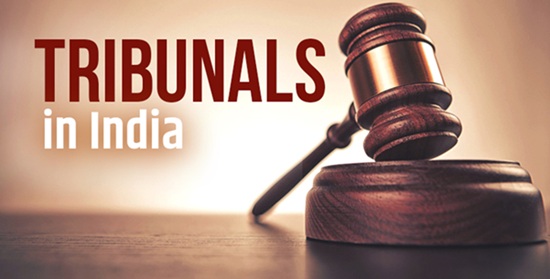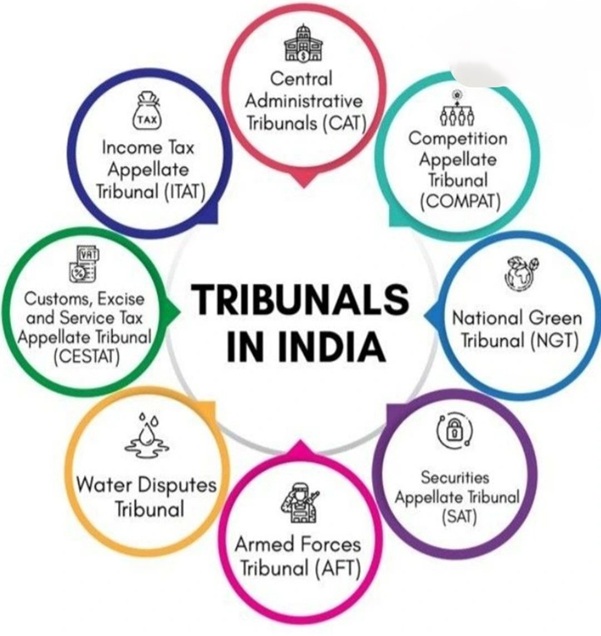Why in Discussion ?
- Recently, the Supreme Court highlighted serious concerns regarding tribunals during the hearing of a petition challenging the constitutional validity of the Tribunal Reforms Act, 2021.
- The concerns primarily involved appointment of staff, service conditions, and judicial independence of tribunals.
- This case has again brought into focus the role, functioning, and need for reforms in the tribunal system in India.

What is a Tribunal ?
- A tribunal is a quasi-judicial body set up for the speedy and specialized resolution of disputes in particular areas.
- Unlike regular courts, tribunals are intended to resolve cases more quickly and leverage technical expertise in specific subjects.
Constitutional Status
- The statutory foundation of India’s tribunal system was laid by the 42nd Constitutional Amendment Act, 1976.
- This amendment added Part XIV-A to the Constitution, which includes Articles 323-A and 323-B.
- Article 323-A
- Empowers the Parliament to establish Administrative Tribunals to adjudicate matters related to the recruitment and service conditions of public servants.
- Such tribunals can be set up at both the Central and State levels.
- Article 323-B
- Provides a list of specialized areas, such as taxation, land reforms, consumer disputes, etc., in which Parliament or State Legislatures may enact laws to establish tribunals.
Key Concerns Related to Tribunals in India
The tribunal system in India faces several challenges that affect its efficiency and judicial independence:
- Lack of Independence in Discharge of Duties: Excessive executive interference in the appointment process and the presence of technical members in tribunals weaken judicial independence.
- High Number of Pending Cases: For example, as of 2021, there were 7,312 pending cases in the Industrial Tribunals-cum-Labour Courts under the central government. Similarly, the Armed Forces Tribunal had 18,829 pending cases.
- Lack of Infrastructure: Many tribunals across the country face shortages in human resources, prolonged vacancies, and inadequate service delivery infrastructure.
- Disputes over Jurisdiction: Confusion often arises regarding the jurisdiction between regular courts and tribunals.
- Absence of Integrated Administrative Control: India has nearly 16 central tribunals functioning under different ministries, which results in a lack of coordination and administrative control.
Reforms and Way Forward
Experts and judicial authorities have proposed several reforms to enhance the capacity and independence of tribunals in India:
- Ensuring Judicial Independence of Tribunal Members: Selection committees for tribunal members should have a majority of jurists and members should be free from external interference.
- Establishment of a National Tribunal Commission (NTC): In the case of L. Chandra Kumar vs. Union of India (1997), it was recommended that an independent body is necessary to oversee the administration of all tribunals.
- Timely Appointments and Increased Staffing: Tribunals should have permanent and specialized staff, rather than relying solely on deputed personnel, to ensure speedy disposal of pending cases.
- Clarifying Jurisdiction and Coordination: The jurisdiction of regular courts and tribunals should be clearly defined to minimize disputes and confusion.
Conclusion
- The purpose of the tribunal system in India is to provide expert justice in specific areas and reduce the burden on regular courts.
- However, issues such as appointment procedures, lack of independence, pending cases, and administrative coordination prevent it from functioning at full capacity.
- Reforms are necessary to make the tribunal system independent, transparent, and efficient.
- The establishment of a National Tribunal Commission, improved appointment procedures, and stable human resources are crucial steps in this direction.
Important Tribunals in India

- Central Administrative Tribunal (CAT)
- Established: 1985
- Jurisdiction/Domain: Service disputes of government employees
- Main Functions: Settlement of disputes related to promotion, transfer, termination, and other service matters
- Income Tax Appellate Tribunal (ITAT)
- Established: 1941
- Jurisdiction/Domain: Income tax and direct tax disputes
- Main Functions: Settlement of disputes under the Income Tax Act
- National Company Law Tribunal (NCLT)
- Established: 2016
- Jurisdiction/Domain: Company law, insolvency, and restructuring
- Main Functions: Resolution of company disputes and insolvency cases
- National Green Tribunal (NGT)
- Established: 2010 (NGT Act, 2010)
- Jurisdiction/Domain: Environmental protection, pollution, natural resources
- Main Functions: Rapid settlement of disputes related to environmental damage and pollution; ensuring environmental justice
- Armed Forces Tribunal (AFT)
- Established: 2007
- Jurisdiction/Domain: Service disputes of the Army, Navy, and Air Force personnel
- Main Functions: Settlement of service-related matters of armed forces personnel
- Securities Appellate Tribunal (SAT)
- Jurisdiction/Domain: Appeals against SEBI orders
- Main Functions: Settlement of disputes related to securities and capital markets
- River Water Disputes Tribunal (RWDT)
- Established: 1956 (under Inter-State River Water Disputes Act, 1956)
- Jurisdiction/Domain: Disputes related to the distribution and use of river water between states
- Main Functions:
- Resolution of disputes between states regarding water distribution and use
- Mediation and fair decision-making on inter-state water agreements
- Decisions approved by the Supreme Court are binding
- Key Examples:
- Brahmaputra and Ganga dam projects disputes
- Cauvery river dispute
- Other inter-state rivers like Musi, Godavari, Krishna
Other Notable Tribunals
|
Tribunal Name
|
Domain / Purpose
|
|
Telecom Disputes Settlement & Appellate Tribunal (TDSAT)
|
Telecommunication disputes, review of TRAI orders
|
|
Customs, Excise and Service Tax Appellate Tribunal (CESTAT)
|
Customs, excise, and GST disputes
|
|
Competition Appellate Tribunal (COMPAT)
|
Review of competition law and anti-trust matters
|
Question 1:
Which statement about tribunals is correct ?
(a) Tribunals are part of regular courts
(b) Tribunals can only be established by states
(c) Tribunals are created for specialized resolution in specific areas
(d) Tribunals are only for criminal cases
Question 2:
Under which Constitutional Amendment was the foundation of the tribunal system in India laid ?
(a) 42nd Amendment, 1976
(b) 44th Amendment, 1978
(c) 73rd Amendment, 1992
(d) 86th Amendment, 2002
Question 3:
Which of the following tribunals deals with environmental disputes ?
(a) NCLT (National Company Law Tribunal)
(b) NGT (National Green Tribunal)
(c) ITAT (Income Tax Appellate Tribunal)
(d) CAT (Central Administrative Tribunal)
|



